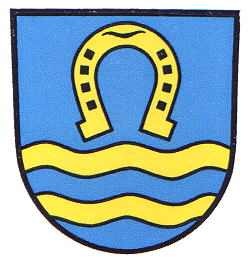Lehrensteinsfeld: Difference between revisions
Jump to navigation
Jump to search
Knorrepoes (talk | contribs) No edit summary |
Knorrepoes (talk | contribs) m (Text replace - "[[Literature" to "{{media}} [[Literature") |
||
| Line 19: | Line 19: | ||
The horseshoe already appeared as a typical village symbol on borderstones in the 18<sup>th</sup> century. In the 19<sup>th</sup> century it was also used in the seals of the municipality. In 1959 the horseshoe was combined with two wavy bars, derived from the arms of the Von Schmidtberg family, Lords of Lehrensteinfeld from 1649-1778. | The horseshoe already appeared as a typical village symbol on borderstones in the 18<sup>th</sup> century. In the 19<sup>th</sup> century it was also used in the seals of the municipality. In 1959 the horseshoe was combined with two wavy bars, derived from the arms of the Von Schmidtberg family, Lords of Lehrensteinfeld from 1649-1778. | ||
{{media}} | |||
[[Literature]] : Bardua, 1987 | [[Literature]] : Bardua, 1987 | ||
Revision as of 00:39, 9 July 2014
| Heraldry of the World Civic heraldry of Germany - Deutsche Wappen (Gemeindewappen/Kreiswappen) |
LEHRENSTEINSFELD
State : Baden-Württemberg
District (Kreis) : Heilbronn
Official blazon
In Blau über zwei goldenen Wellenbalken ein goldenes Hufeisen.
Origin/meaning
The arms were granted on August 18, 1959.
The horseshoe already appeared as a typical village symbol on borderstones in the 18th century. In the 19th century it was also used in the seals of the municipality. In 1959 the horseshoe was combined with two wavy bars, derived from the arms of the Von Schmidtberg family, Lords of Lehrensteinfeld from 1649-1778.
Contact and Support
Partners:
Your logo here ?
Contact us
© since 1995, Heraldry of the World, Ralf Hartemink 
Index of the site
Literature : Bardua, 1987











